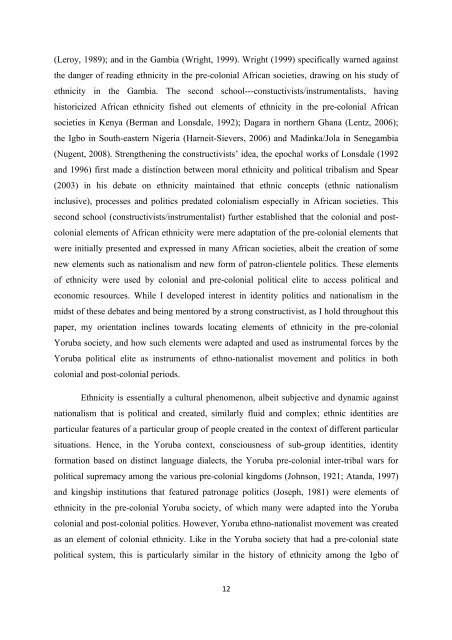The Yoruba Nationalist Movements, Ethnic Politics and Violence: A ...
The Yoruba Nationalist Movements, Ethnic Politics and Violence: A ...
The Yoruba Nationalist Movements, Ethnic Politics and Violence: A ...
Create successful ePaper yourself
Turn your PDF publications into a flip-book with our unique Google optimized e-Paper software.
(Leroy, 1989); <strong>and</strong> in the Gambia (Wright, 1999). Wright (1999) specifically warned against<br />
the danger of reading ethnicity in the pre-colonial African societies, drawing on his study of<br />
ethnicity in the Gambia. <strong>The</strong> second school---constuctivists/instrumentalists, having<br />
historicized African ethnicity fished out elements of ethnicity in the pre-colonial African<br />
societies in Kenya (Berman <strong>and</strong> Lonsdale, 1992); Dagara in northern Ghana (Lentz, 2006);<br />
the Igbo in South-eastern Nigeria (Harneit-Sievers, 2006) <strong>and</strong> Madinka/Jola in Senegambia<br />
(Nugent, 2008). Strengthening the constructivists’ idea, the epochal works of Lonsdale (1992<br />
<strong>and</strong> 1996) first made a distinction between moral ethnicity <strong>and</strong> political tribalism <strong>and</strong> Spear<br />
(2003) in his debate on ethnicity maintained that ethnic concepts (ethnic nationalism<br />
inclusive), processes <strong>and</strong> politics predated colonialism especially in African societies. This<br />
second school (constructivists/instrumentalist) further established that the colonial <strong>and</strong> postcolonial<br />
elements of African ethnicity were mere adaptation of the pre-colonial elements that<br />
were initially presented <strong>and</strong> expressed in many African societies, albeit the creation of some<br />
new elements such as nationalism <strong>and</strong> new form of patron-clientele politics. <strong>The</strong>se elements<br />
of ethnicity were used by colonial <strong>and</strong> pre-colonial political elite to access political <strong>and</strong><br />
economic resources. While I developed interest in identity politics <strong>and</strong> nationalism in the<br />
midst of these debates <strong>and</strong> being mentored by a strong constructivist, as I hold throughout this<br />
paper, my orientation inclines towards locating elements of ethnicity in the pre-colonial<br />
<strong>Yoruba</strong> society, <strong>and</strong> how such elements were adapted <strong>and</strong> used as instrumental forces by the<br />
<strong>Yoruba</strong> political elite as instruments of ethno-nationalist movement <strong>and</strong> politics in both<br />
colonial <strong>and</strong> post-colonial periods.<br />
<strong>Ethnic</strong>ity is essentially a cultural phenomenon, albeit subjective <strong>and</strong> dynamic against<br />
nationalism that is political <strong>and</strong> created, similarly fluid <strong>and</strong> complex; ethnic identities are<br />
particular features of a particular group of people created in the context of different particular<br />
situations. Hence, in the <strong>Yoruba</strong> context, consciousness of sub-group identities, identity<br />
formation based on distinct language dialects, the <strong>Yoruba</strong> pre-colonial inter-tribal wars for<br />
political supremacy among the various pre-colonial kingdoms (Johnson, 1921; At<strong>and</strong>a, 1997)<br />
<strong>and</strong> kingship institutions that featured patronage politics (Joseph, 1981) were elements of<br />
ethnicity in the pre-colonial <strong>Yoruba</strong> society, of which many were adapted into the <strong>Yoruba</strong><br />
colonial <strong>and</strong> post-colonial politics. However, <strong>Yoruba</strong> ethno-nationalist movement was created<br />
as an element of colonial ethnicity. Like in the <strong>Yoruba</strong> society that had a pre-colonial state<br />
political system, this is particularly similar in the history of ethnicity among the Igbo of<br />
12

















